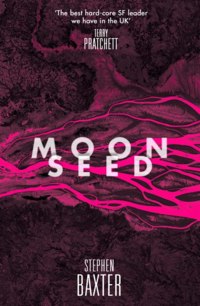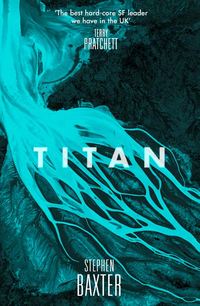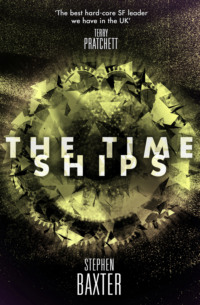
Полная версия
Origin
People had fled inland, a secondary tide of misery, away from the devastated coasts. Already there had been too many deaths even to count, from flooding and tsunamis and ’quakes – and there were surely many more to come, as the displaced populations succumbed to disease, and flooded-out farmers failed to return a crop, and as the wars broke out over remaining stocks.
Meanwhile, as the polar seas flexed, titanic rafts of ice broke away from the shelves of Antarctica and the glaciers of Alaska and Greenland. The larger bergs broke up in the tempestuous seas, but many of them survived to the Equator, filling the oceans, already all but impassable, with an additional hazard. And so bergs like this one were now common sights at all latitudes on the seaboards of the Atlantic and Pacific. In some places they were actually being mined to make up for the disrupted local supplies of clean fresh water. Always a silver lining, Malenfant thought sourly.
He stripped off his sweaty track suit and ran naked into the surf. Deeply mixed by the Tide with the waters of the deep ocean, the sea was icy cold and very salty, stinging when it splashed his eyes and the scar tissue on his healing arm. He took care not to go far out of his depth; he could feel a strong undercurrent as the sea drew back.
He swam a few strokes and then lay on his back, studying the sky, buoyant in the salty water.
The Red Moon was fat and swollen in the sky above him. Though it had (somehow) inserted itself into the same orbit as the old, vanished Moon, it was more than twice Luna’s diameter, as large in area as five old Moons put together – and a lot more than five times as bright, because of its reflective cloud and water.
And this morning, the Red Moon was blue. The hemisphere facing him showed a vast, island-strewn ocean, blue-black and cloud-littered, with the shining white of ice caps at the northern and southern extremes. The Red Moon’s north pole was tilted towards Earth by ten degrees or so, and Malenfant could see a huge high-pressure system sitting over the pole, a creamy swirl of cloud. But dark bands streaked around the equator, clouds of soot and smoke.
Malenfant, for all his personal animosity, admitted that the new Moon was hauntingly lovely. It even looked like a world: obviously three-dimensional, with that shading of atmosphere at the sunlit limb, and sun casting a big fat highlight on its wrinkled ocean skin, as if it were some immense bowling ball. Poor Luna had been so dust-choked that its scattered light had made it look no more spherical than a painted dinner plate.
Malenfant, understandably obsessive, had kept up with the evolving science of the Red Moon.
The new Moon turned on its axis relative to Earth – unlike departed, lamented Luna with – a ‘day’ of about thirty hours, so that Earthbound watchers were treated to views of both sides. The other hemisphere was dominated by the worldlet’s main landmass: a supercontinent, some called it, a roughly circular island-continent with a centre red as baked clay, and fringed by grey-green smears that might be forests. The Red Moon was hemispherically asymmetric, then: like Mars and Luna, unlike Earth and Venus.
That great continent was pitted by huge, heavily eroded impact craters: to Malenfant they were an oddly pleasing reminder of true, vanished Luna. And the centre of the supercontinent was marked by a single vast volcano that thrust much of the way out of the atmosphere. Its immense, shallow flanks, as seen in the telescope, were marked at successively higher altitudes by (apparent) rings of vegetation types, what appeared to be glaciers, and then by bare rock, giving it to terrestrial observers something of the look of a shooting target. (And so the commentators had called it Bullseye.)
The Red Moon’s mightiest river rose on the flanks of the Bullseye. Perhaps that great magma upwelling had lifted and broken ancient aquifers. Or perhaps air uplifted by the great mountain was squeezed dry of its water by altitude. Anyhow the river snaked languidly across a thousand miles to the eastern coast, where it cut through a mountain chain there to reach the sea at a broad delta.
There were mountains on both east and west coasts of the supercontinent. They were presumably volcanoes. Those on the east coast appeared to be dormant; they were heavily eroded, and they seemed to cast a rain shadow over the desiccated interior of the continent. There was, however, a comparatively lush belt of vegetation between the mountains and the coast. The commentators had called it the Beltway. The greenery pushed its way into the interior of the continent in a narrow strip along the valley of that great river, which was a Nile for this small world.
But the mountains on the west coast were definitely not dormant. Presumably prompted by rock tides induced by Earth’s gravity field, they had been observed to begin erupting a few days after the Red Moon’s arrival in orbit around Earth.
They must have been spectacular eruptions. Thick, dense rock near the surface appeared to have blocked the magma flows, bottling up increasing pressure before yielding explosively like a champagne cork flying out of a bottle. On Earth, such stratovolcanoes – like Mount Fuji, Mount Rainier – could eject debris miles into the air. On the Moon the volcanoes had blown debris clear of the planet altogether. Meanwhile vast quantities of dust and gases had been pumped into the atmosphere, to spread in thick bands around much of the Moon’s middle latitudes.
There was a great deal you could tell about the Red Moon, even from a quarter-million miles, with telescopes and spectrometers and radar, as the two hemispheres conveniently turned themselves up for inspection. For instance, those oceans really were water. The temperature range was right – as you’d expect since the Moon shared Earth’s orbit around the sun – and examination of the visible and infra-red spectra showed that the clouds’ caps were made of water vapour, just the right amount to have evaporated off the oceans.
The Red Moon’s surface gravity was some two-thirds Earth’s – a lot more than Luna’s, and, crucially, enough for this miniature planet to have retained all the essential ingredients of an Earthlike atmosphere: oxygen, nitrogen, carbon, water vapour, carbon dioxide – unlike poor barren Luna. So the Red Moon had water oceans and a nitrogen-oxygen atmosphere.
Already the study of the Red Moon had revolutionized the young science of planetology. With a quarter of Earth’s mass – but four times the mass of Mars, some twenty times the mass of Luna – the Red Moon was a planet in its own right, intermediate in size between the Solar System’s small and large denizens, and so a good test-bed for various theories of planetary formation and evolution.
It differed in key ways from Earth. Because it was so much smaller, it must have started its formation (wherever that had occurred) with a much smaller supply of heat energy than Earth. And that inner heat had been rapidly dissipated through its surface.
Like a shrivelled orange, the Red Moon’s rind was thick. Probably aeons ago, the tectonic plates fused, and continents no longer slid over its face. There was no continental drift, no tectonic cycling, no oceanic ridges. Unlike Earth, the Moon’s uncycled surface was very ancient; and that was why the interior of the continent bore those huge eroded craters, the scars left by immense impacts long ago.
And that was why the Bullseye was so vast. The huge shield mountain had probably formed over a fountain of magma erupting through a flaw in the crust layers. The crust beneath it must have been held in place over the flaw for hundreds of millions of years – so it more resembled Mars’s Olympus Mons than, say, Earth’s Hawaiian islands.
But there was more than geology up there. On the Red Moon, it appeared, there was life.
The air was Earthlike, containing around a sixth oxygen – a smaller proportion than Earth’s atmosphere, but difficult to explain away by non-living processes. It hadn’t taken long to establish that the green-grey pigment that stained the fringes of the supercontinent and its wider river valleys, as well as the shallower sections of the world ocean, was chlorophyll, the green of plants. There were other fingerprints of a living world: an excess of methane in the air, for example, put there perhaps by bacteria in bogs, or burning vegetation, or even the farts of Moon-calves. Though some scientists remained sceptical – and though nobody could say for sure if the Red Moon harboured anything like bogs or bacteria or cows – most people seemed to concur that there was indeed life on the Red Moon, life of some sort.
But was there intelligence?
Nobody had detected any structured radio signals. There had been no response to various efforts to signal to the Red Moon using radio and TV and laser, not to mention a few wacko methods, like the cutting of a huge right-angled triangle of ditches into the Saharan desert filled with burning oil.
But what were the mysterious lights that flickered over the night lands? Most observers claimed they were forest fires caused by lightning or drought. Perhaps, perhaps not. Could the streaming ‘wakes’ sometimes visible on the great oceans be the wakes of ships, or were they simply peculiar meteorological features? And what about the geometrical traces – circles, rectangles, straight lines – that some observers claimed to have made out in clearings along the coasts and river valleys of the Red Moon’s single huge continent? What were they but evidence of intelligence?
And if any of these signs were artificial, what kind of being might live up there to make them?
Malenfant was willing to admit that one manned expedition could do little to probe the mysteries of a world with fully half the surface area of Earth. But there were mysteries that no amount of remote viewing could unravel. The fact was, the most powerful telescope could not resolve an individual human being up there.
Malenfant was never going to find Emma by staring up from Earth.
But at this time of crisis, nobody wanted to see Malenfant’s drawings of rocket boosters and gliding spaceships.
Of course there was the question of resources, of priorities. But Malenfant suspected that people were shying away from dealing with the most fundamental issue here: the existence of the Red Moon itself. It was just too big, too huge, impossible to rationalize or grasp or extrapolate. The Wheel was different. A blue circle in the air, a magic doorway? Yes, we can imagine ways we might do that, even if we can’t think why we should. Peculiar-looking human beings falling out of the air? Yes, we know about the plasticity of the genome; we can even imagine time travel, the retrieval of our flat-browed ancestors. But what kind of power hangs a new Moon in our sky?
He didn’t last long in the water; it was too cold. He took a few brisk strokes until the water was shallow enough for him to walk. He splashed out of the surf, shivering, briskly dried himself on his shirt, and began to pull on his pants.
There was somebody standing beside the beached berg fragment, just a slim shadow in the grey dawn light, watching him.
Fire:
Maxie is running around Fire’s feet. ‘Hide and seek. Hide and seek, Fire. Hide and seek.’
Fire stares at Maxie. To him the boy is a blur of movement and noise, unpredictable, incomprehensible, fascinating.
Maxie has leaves on his head. They flutter away as he runs. Sally puts them back on. ‘No, Maxie,’ she says. ‘Be careful of the sun.’
‘Hide and seek, hide and seek.’ He stands still. His hands cover his eyes. ‘Hands, Fire, eyes, Fire.’ His hands cover his eyes.
Fire puts his hands over his eyes. It is dark. The night is dark. He starts to feel sleepy.
Maxie calls, ‘Eight nine ten ready! Fire Fire Fire!’
Fire lowers his hands. It is not night. The sunlight is bright. The world is red and green and blue. He blinks.
Maxie has gone away.
Fire sees Sing on her bower of leaves. He walks towards her. He has forgotten Maxie.
Maxie is at his feet. ‘Here I am, here I am!’ Maxie stamps his foot. Red dust rises and sticks to Maxie’s white flesh. ‘You have to try, you silly. You have to play it right. Try again, try again. Eyes, Fire, hands, Fire.’ He covers his eyes.
As the sun climbs into the sky, the game goes on. Every time Maxie disappears Fire forgets about him. Every time he comes back Fire is surprised to see him.
Fire grows hungry. Fire thinks of himself in the forest, eating nuts and berries and leaves. Fire lopes towards the forest.
‘Come back, come back, you nasty!’ Maxie falls to the dirt and howls.
Emma comes running to Fire. ‘Fire, are you going to the forest? Can I come with you?’
Fire. Forest. That is what Fire hears.
‘Em-ma,’ he says.
Emma has blue hair. Fire frowns. He thinks of Emma with brown hair. Fire’s hand touches Emma’s hair. The blue hair is smooth like skin. It has bits of white vine stuck to it.
Emma says, ‘It’s just a hat, Fire. Just parachute silk.’ She puts the blue hair back on her head and pulls the vines under her chin. ‘Can I come to the forest?’
There is something on Emma’s chest. It is bright red. Berries are bright red. Fire touches the berry. It is hard. It is stuck to a vine. The vine is around Emma’s neck. His teeth bite the berry-thing. It is hard, like a nut. His teeth cannot break the shell.
Emma pulls it back from him. ‘It’s my knife, Fire. I showed you yesterday. And the day before. And the day before that. Look.’ Emma touches her knife. When she shows him again, there is a red part, and a part like a raindrop. There is a spot of light behind the raindrop, on Emma’s hand. Emma is smiling. ‘See, Fire? The lens? Remember this?’
Fire sees the raindrop and the light. He hoots.
Emma steps away. ‘Emma hungry. Emma forest. Fire forest. Emma Fire forest.’
Fire thinks of Emma and Fire in the forest, gathering berries, eating berries. He smiles. ‘Emma Fire forest. Berries trees nuts.’
Emma smiles. ‘Good. Let’s go.’ She takes his hand.
The forest is a huge mouth. It is dark and green and cool.
He waits at the edge of the forest. His ears listen, his eyes see. The forest is still.
His legs walk into the wood. His feet explore the ground, finding soft bare earth. His arms and his torso and his head duck around branches. He is not thinking of how his body is moving.
His eyes learn to see the dark. His nose smells, his ears listen. He is not aware of time passing, of the sun climbing in the sky, of the dappled bits of light at his feet sliding over the forest-floor detritus.
He sees a pitcher plant. It is a big purple sac, high above his head. His hands pull it down. There is water in the pitcher plant. There are insects in the water. His hand scoops out water and insects. He drinks the water. It tastes sweet. His teeth crunch the insects.
Emma is here. He has forgotten she was here. He gives her the pitcher plant.
Her hand lifts water and bugs to her mouth. She coughs. She spits out insects.
His eyes see a cloudberry plant. It has white flowers and pink fruit. His hands pull the fruit from the plant, avoiding the spiky brambles. His mouth chews the berries.
Here is Emma. Her hands explore the blue skin on her legs. Now she has a soft shining thing in her hands. Her hands open a mouth in the shining thing. She feeds the mouth with berries. He can see them in the stomach of the shining thing.
She holds up the shining thing. ‘This is a bag, Fire. These berries are for Sally and Maxie. I can carry more in the bag than I can with my hands. You see? …’
He thinks of Sally eating berries. He thinks of Maxie eating berries.
He thinks of Sing, on her bower. He thinks of Sing eating berries. His hands pluck berries. His mouth wants to eat the berries, but he thinks of Sing eating them. He keeps the berries in his hands.
His legs move him on. Soon he forgets about Sing, and his mouth eats the berries.
He finds a chestnut tree. It has leaves the size of his hands and sticky buds and nuts. Beneath the chestnut something white is growing. His hands and eyes explore it. It is a morel, a mushroom. His hands pull great chunks of it free, and lift them to his mouth.
Emma is here. Her hands are taking nuts from the chestnut. The nuts want to hurt Emma. He slaps her hands so they stop taking the nuts.
His ears hear a grunt, a soft rustle.
He stops thinking. He stops moving. His ears listen, his nose smells, his eyes flicker, searching.
His eyes see a dark form, squat. It has arms that move slowly. He sees eyes glinting in the green gloom. He sees ears that listen. He sees orange-brown hair, a fat heavy gut, a head with huge cheeks, a giant jaw.
It is a Nutcracker-man.
The Nutcracker-man grunts. He lifts pistachio nuts to his huge mouth. Fire can see his broad, worn teeth, glinting in the dappled light. The Nutcracker-man grinds the nuts between his giant teeth.
Fire’s mouth fills with water, to tell him it wants the nuts.
Fire stands up suddenly. He rattles branches and throws twigs. ‘Nutcracker-man. Ho!’
The Nutcracker-man screeches, startled. His arms lift him into a tree and swing him away, crashing through foliage, bits of nut falling from his mouth.
Fire pushes through the brush. His hands cram the nuts into his grateful mouth.
Emma is here. Her hands are taking nuts and putting them into the mouth of the shining thing.
His nose can still smell the dung of the Nutcracker-man. He thinks of many Nutcracker-folk, out in the shadows of the forest.
His legs take him away from the place with the pistachio nuts, back towards the open daylight.
Emma follows him. But he has forgotten Emma. He remembers the nuts and the fungus and the Nutcracker-man.
Reid Malenfant:
He kept right on pulling on his pants. When he was done, his breath misting slightly, he walked up the slope of the eroded beach.
His silent observer was a woman: little more than a girl, really, slim, composed, dark. She was wearing a nondescript jumpsuit. She was very obviously Japanese.
‘I know you,’ he said.
‘We have not met.’ Her voice was deep, composed. ‘But, yes, I know you too, Reid Malenfant.’
‘Just Malenfant,’ he said absently, trying to place her. Then he snapped his fingers. ‘You were on Station when –’
‘– when the Moon changed. Yes. My name is Nemoto.’ She bowed. ‘I am pleased to meet you.’
He bowed back. He felt awkward. He couldn’t care less if she had glimpsed his wrinkly ass. But he wished, oddly, that he had his shoes on.
He looked up and down the beach. He saw no sign of transportation, not so much as a bicycle. ‘How did you get here?’
‘I walked. I have a car, parked at the Beachhouse.’
‘As I have.’
‘Yes.’
‘Will you walk back that way with me?’
‘Yes.’
Side by side, in the gathering pink-grey light, they walked north along the beach.
Malenfant glanced sideways at Nemoto. Her face was broad, pale, her eyes black; her hair was elaborately shaved, showing the shape of her skull. She could have been no more than half Malenfant’s age, perhaps twenty-five.
‘The Red Moon is very bright,’ she said.
‘Yes.’
‘It is a great spectacle. But it will be bad for the astronomers.’
‘You were an astronomer …’
‘I am an astronomer.’
‘Yeah. Sorry.’
Nemoto was a Japanese citizen trained as an astronaut at NASA. Her speciality had been space-based astronomy. She had been the brilliant kid who had made it all the way into space at the incredibly young age of twenty-four. He remembered Nemoto as being bright, excitable, even bubbly. Well, she wasn’t bright and bubbly now. It was as if she had gone into eclipse.
‘I have been looking for you,’ she said now. ‘I have missed you several times in your tour of the NASA centres. Malenfant, when you are not at your scheduled meetings, you are something of a recluse.’
‘Yeah,’ he said ruefully. ‘Nowadays more than I’d like to be.’
‘You miss your wife,’ she said bluntly.
‘Yes. Yes, I miss my wife.’
‘I almost found you at your church.’
‘The chapel at Ellington Air Force Base?’
‘I had not realized you are Catholic’
‘I guess you should call me lapsed. I converted when I married Emma, back in ’82. Emma, my wife. It was for the sake of her family. When I joined NASA we looked around for a chapel. Ellington was near Johnson, and a lot of my colleagues and their families went there, and we liked the priest …’
‘Are you religious now?’
‘No.’ He had tried, for the sake of the priest, Monica Chaum, as much as anybody else. But, unlike some who came back from space charged with religious zeal, Malenfant had lost it all when he made his first flight into orbit. Space was just too immense. Humans were like ants on a log, adrift in some vast river. How could any Earth-based ritual come close to the truth of the God who had made such a universe?
‘So I gave up the chapel. It caused some problems with Emma’s family. But she supported me. She always did.’
‘But now you have returned to the faith?’
‘No. I do find the chapel kind of restful. But I get a lot more comfort from going out on a toot with Monica Chaum over at the Outpost. She has quite a capacity for a woman Catholic priest. I make no excuses; I’d been through a lot.’ He eyed her. ‘As have you.’
‘Yes.’ Her face, never beautiful, was empty of expression. ‘As is well known.’
Nemoto had been aboard the International Space Station, in low Earth orbit, when the Red Moon had made its dramatic entrance. Nemoto had been forced to watch from orbit as the first great tides battered at Japan.
‘I returned to Earth as soon as I could. I and my colleague used our Japanese Hope shuttle. You may know that our landing facility was at Karitimati Island in the South Pacific –’
‘Where? Oh, yeah, Christmas Island.’
‘There is little left of Karitimati. We were forced to come down here, at KSC.’
He said carefully, ‘Where was your home?’
‘I have no home now,’ was all she would reply.
He nodded. ‘Nor do I.’ It was true. He had an empty house in Clear Lake, but the hell with that. His home was with Emma – wherever she was.
Nemoto paused and looked into the sky. Although the first liquid glimmer of sun was resting on the horizon, the Red Moon still shone bright in the sky. ‘If you have abandoned your attempts to acquire faith, you do not believe that God is responsible for that?’
He grinned, rubbing his hand over his bare scalp, feeling a time of salt there. ‘Not God, no. But I think somebody is.’
‘And you would like to find out who.’
‘Wouldn’t you?’
‘Do you believe that the bodies which fell through the African portal were human?’
He frowned, taken aback by the question. ‘Nobody can make much of the mashed-up remains that they scraped out of the savannah.’
‘But they appear to be human, or a human variant. You saw them, Malenfant. I’ve read your testimony. They share our DNA – much of it, though the recovered sequences show a large diversity from our own genome. There is speculation that they are more like one of our ancestors, a primitive hominid species.’
‘Yeah. So there are ape-men running all over our new Moon up there, right? I read the tabloids too.’
‘Malenfant, what do you believe?’








